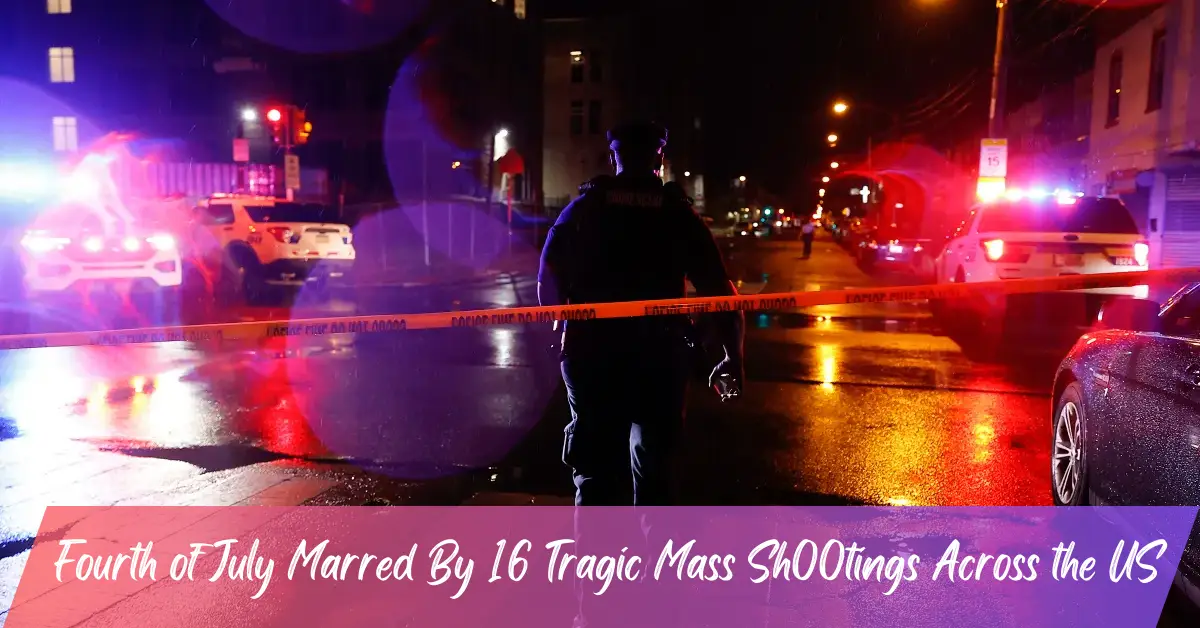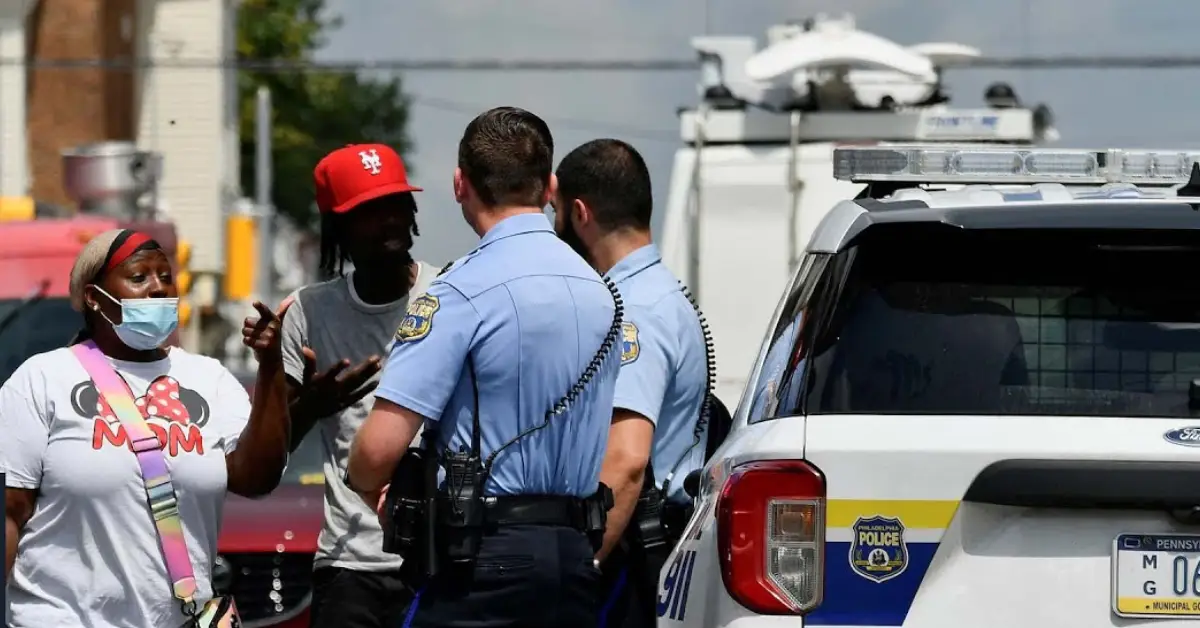The Fourth of July long weekend in the United States was overshadowed by 16 mass sh00tings, from the nation’s capitol to Fort Worth, Texas, from Florin, California, in the west to the Bronx, New York, in the east.
The Gun Violence Archive, an authoritative database on gun violence in America, created the tragic figure by defining a mass sh00ting as an incident in which four or more people, excluding the gunman, were ki!!ed or injured by weapons.
The catastrophic bloodletting occurred between 5 p.m. on Friday to 5 a.m. on Wednesday across 13 states and Washington, DC. Texas and Maryland both had two entries in the register.
Nine people were injured in a drive-by sh00ting in Washington in the early hours of Wednesday, one of the final tragedies to tarnish the weekend commemorating the nation’s founding. Two of the fatalities were children, ages nine and seventeen. All of the injuries were described as non-life threatening.
According to police, bullets were fired from a dark-colored SUV at a home party in the city’s north-east sector shortly before 1 a.m. on July 5. The SUV “fired shots in the direction of some of our residents who were celebrating the Fourth of July outside.” “It appears that the shooting was targeted,” stated Assistant Police Chief Leslie Parsons.
Hours earlier, Joe Biden delivered a statement from the White House on the Fourth of July, lamenting the “wave of tragic and senseless shootings in communities across America.” The president and first wife Jill Biden “grieve for those who have lost their lives, and as our nation celebrates Independence Day, we pray for the day when our communities will be free of gun violence,” according to the president.
Biden reiterated his support for “meaningful, commonsense” gun control legislation, including a renewed ban on assault weapons and high-capacity magazines, as well as an end to the immunity of gun makers from accountability.
According to the Gun Violence Archive, the United States is on course to have one of the worst years in terms of mass sh00tings. The database has detected 350 such instances so far this year and cautions that if the pace continues through the second half of the year, the total in 2023 might reach 679, nearly double the number recorded in 2018.
The following cities were involved in mass sh00tings over the Fourth of July weekend: Washington, DC, Illinois, Indiana, Kansas, Maryland (twice), Michigan, Minnesota, Missouri, New York, North Carolina, Ohio, Oklahoma, Pennsylvania, and Texas (twice).
One of the weekend’s youngest casualties was a 14-year-old kid m*rdered in a sh00ting at a Fourth of July block party on Maryland’s eastern coast early Wednesday. Six additional people were injured in the Salisbury tragedy.
On Sunday, a mass sh00ting in Baltimore, Maryland ki!!ed two people and injured 28, including 15 children. Videos taken at the site showed teenagers running away from the gunfire. On Wednesday, police were still looking for the sh00ters, who were believed to have used a semi-automatic rifle.
Wes Moore, Maryland’s Democratic governor, said, “In just a few days, two mass shootings in our beloved state have taken lives and ripped at the fabric of our communities.”
My statement on the mass shooting in Salisbury and the scourge of gun violence in our communities: pic.twitter.com/4ULY6kcEZX
— Governor Wes Moore (@GovWesMoore) July 5, 2023
Moore expressed sympathies to victims and families and gratitude to first responders, saying, “this epidemic of gun violence is not something that any one town or any one group is grappling with… “I believe I speak for everyone when I say that enough is enough.”
Another outdoor party in Shreveport, Louisiana, exploded in gunfire late Tuesday, ki!!ing three people and injuring ten others.
Tabitha Taylor, a local councilwoman, expressed her outrage to CBS News.
“Now we are the victims of a mass shooting in our community simply because individuals decided to come in and disrupt a good time that people were having,” she explained.
“A family event in our community that has been going on for years has been disrupted by gunfire because someone decided to pull their guns and do this.” “Why, why, why?”
If you’re interested in reading about the recent news, you can check out the below links:-
Angie Willhite, a Shreveport police sergeant, told reporters on Wednesday that one of the injured was in critical condition but that the others were expected to recover. There had been no arrests.
“We are struggling with getting information from those who were present,” Willhite explained. “We’re not getting a lot of cooperation. We’re going to hope for some quick and immediate cooperation that will lead us to the people we’re trying to find.”
The most individuals slain in a single incident over the long weekend occurred in Philadelphia, where five people were ki!!ed on Monday night when a sh00ter wearing a bulletproof vest and wielding an assault weapon went on a random spree.
The person that d!ed was 15 years old. A two-year-old kid was shot in the legs four times, while a 13-year-old boy was shot twice. Both were listed in stable condition on Wednesday.
Prosecutors said the 40-year-old defendant was charged with five counts of m*rder, attempted m*rder, aggravated assault, and weapons offenses of possession without a license and carrying firearms in public.
Police in Philadelphia identified the victims as 20-year-old Lashyd Merritt, 29-year-old Dymir Stanton, 59-year-old Ralph Moralis, and 15-year-old Daujan Brown. All were pronounced deαd shortly after the gunfire on Monday night.
Joseph Wamah Jr, 31, was discovered with bullet wounds in a residence early Tuesday. Investigators believe Wamah was the first victim ki!!ed, but family members did not find her body until hours later.
Till Then, keep yourself updated with all the latest news from our website blhsnews.com.
Tyler is a passionate journalist with a keen eye for detail and a deep love for uncovering the truth. With years of experience covering a wide range of topics, Tyler has a proven track record of delivering insightful and thought-provoking articles to readers everywhere. Whether it’s breaking news, in-depth investigations, or behind-the-scenes looks at the world of politics and entertainment, Tyler has a unique ability to bring a story to life and make it relevant to audiences everywhere. When he’s not writing, you can find Tyler exploring new cultures, trying new foods, and soaking up the beauty of the world around him.


